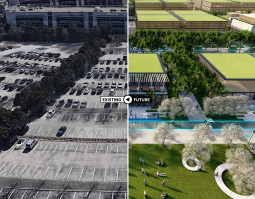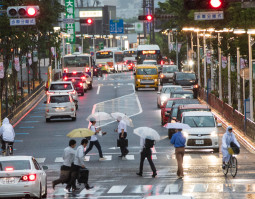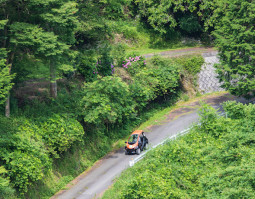Mobility Foundation Projects in Germany Offer Transport Solutions to Rural and Older Riders
Smart Shuttle: Trier, Germany
The Trier, Germany, Smart Shuttle aims to develop on-demand mobility solutions to improve access primarily for people with disabilities and elderly; extend public transport options to underserved areas; and improve the carbon footprint of the area by introducing emission-free shuttles, replacing low frequented bus lines. Ultimately, the goal is to collaborate with civic and other local organizations to build a solution set for rural and semi-rural areas to improve accessible public transport.
With an aging population and an increased number of people with disabilities (PwD), public transport plays a crucial role in providing life provisions, medical support, and enabling social participation. However, public transport in the region is not yet inclusive or flexible enough to offer adequate support for the population most in need. Working with The City of Trier, Germany; SWT City Utility Trier; and IOKI GmbH (an on-demand- shuttle), TMF is addressing this issue by adapting public transport to offer greater accessibility.
With mobility for an aging population a growing problem across Europe, the proof of concept for the solutions (POC) could be further extended to other smaller cities and regions, which are dominant in the EU2. Yokoten opportunities have already been identified in Dignes, France, and Venice, Italy.
Public transport traditionally relies on large vehicles and fixed schedules. Introducing flexible solutions with smaller vehicles allows public transport operators to add services in low-frequency areas, enhancing accessibility for people with disabilities and reducing operational costs. TMF's contribution will help develop market-ready solutions to assist consumers towards sustainable public transport options better-suited to meeting their needs.
The primary beneficiaries of this project are people living in poorly served rural and semi-rural areas, as well as PwD, allowing them to use customized shared mobility.
LocalHelper: Bitburg-Prüm, Germany
LocalHelper, LocalHelfer in German, is an innovative online tool, where people needing support can be matched with volunteers in their neighborhood, powered by an algorithm that pairs the closest helper to the requester based on specific need.
Initiated during the early days of the pandemic, when government agencies were overwhelmed with requests for help, the project was designed to create a neighborhood help system, providing seniors and unvaccinated people with the basics of life by engaging their neighbors as nearby “supporters.” Collaborating with TMF were the Bitburg-Prüm regional government, the German Red Cross, German Caritas, volunteer groups from the region, and software development by Erlkönig.io.
A growing number of seniors and people with disabilities who live in remote areas in Europe are dependent on inadequate or non-existent public transport, which creates isolation and hardship in these lesser-served areas. From basic needs, such as food and medical appointments, to social connectivity, a large gap is emerging. The EU estimates that 30 million people consistently feel lonely, and that 75 million people talk with another person only once a month.
The solution? Build an online tool to facilitate social interaction—one that could be adapted for a range of uses, such as ride sharing, errands, walking the dog, etc. The primary beneficiaries of this project are people with reduced mobility, including seniors or people with disabilities. However, the broader community will also benefit from enhanced communication, creating networks and bridging barriers.
The project was completed in 2021
Digital Ride-Sharing Bench: Bitburg-Prüm, Germany
The Digital Ride-Sharing Bench is an innovative online matchmaking tool, where people needing support can access car owners offering rides in their area. Creating a safer and more reliable solution instead the “hope” that a driver with the same target direction is passing by.
The project was aimed initially at securing a neighborhood mobility system, which would provide rides for seniors or anyone without their own vehicle or other transport options. Volunteers placed benches have been at locations along major country roads with signage allowing riders to select a destination from among neighboring towns. Passing motorists could stop and give a ride to the person on the bench. But the “system” was not very reliable, hampered by uncertainty that a car will pass traveling in the same direction.
To help improve the system and make it more secure and reliable, TMF supported by building a digital platform (App durch die Eifel) where people searching for a ride can pre-arrange trips before reaching the bench. Primary beneficiaries of this project are people with reduced mobility, including seniors or people with disabilities.
The project was supported by collaborations between the Bitburg-Prüm regional government, the German Red Cross, German Caritas, DevLabor software, and local volunteer groups.
The Need for Support: Vulnerable groups, including the disabled and elderly, often face significant barriers in their daily lives. These barriers can range from physical obstacles in the environment to social and economic challenges that limit their participation in community activities. Mobility is a key factor in overcoming these barriers, enabling individuals to access essential services, engage in social interactions, and lead fulfilling lives.
The Role of Toyota Mobility Foundation: The Toyota Mobility Foundation is dedicated to creating innovative solutions that enhance mobility and accessibility for all. Our projects, such as the Serve the City app, the Local Helper platform, and the on-demand shuttle service in Trier, exemplify our commitment to fostering inclusive societies. By leveraging technology and community engagement, we aim to break down barriers and provide opportunities for everyone to contribute to and benefit from a connected and supportive community.
Why Mobilizing Society Matters: Mobilizing society to help vulnerable groups is crucial for several reasons:
- Empowerment and Independence: By providing accessible mobility solutions, we empower individuals to live independently and confidently. This independence is vital for their self-esteem and overall well-being.
- Social Inclusion: Mobility enables social interactions, allowing individuals to participate in community events, access healthcare, and engage in recreational activities. This inclusion is essential for building a cohesive and supportive society.
- Economic Participation: Accessible mobility solutions enable individuals to contribute to the economy, whether through employment, volunteering, or other forms of engagement. This participation strengthens the community and fosters economic growth.
- Human Dignity: At the core of our efforts is the belief that every individual deserves to live with dignity. By addressing mobility challenges, we uphold this principle and ensure that vulnerable groups are treated with respect and compassion.



